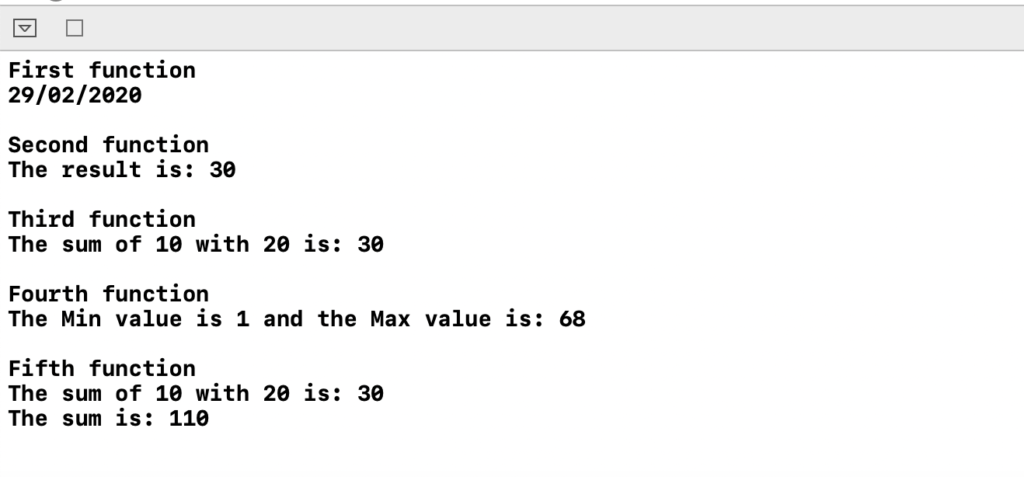In this post, we will see how to manage Functions in Swift.
WITHOUT PARAMETERS IN INPUT & WITHOUT RETURN VALUE
1 2 3 4 5 6 7 8 9 10 11 12 13 14 | import UIKit// [Without parameters in input]// [Without return value]func printDate(){ let varDate = Date() let formatDate = DateFormatter() formatDate.dateFormat = "dd/MM/yyyy" print(formatDate.string(for: varDate)!)}print("First function")printDate()print("") |
WITH PARAMETERS IN INPUT & WITHOUT RETURN VALUE
1 2 3 4 5 6 7 8 9 10 11 | // [With parameters in input]// [Without return value]func sumInt(val1:Int, val2:Int){ let result = val1 + val2 print("The result is: \(result)")}print("Second function")sumInt(val1: 10, val2: 20)print("") |
WITH PARAMETERS IN INPUT & WITH RETURN VALUE
1 2 3 4 5 6 7 8 9 10 11 12 | // [With parameters in input]// [With return value]func sumInt2(val1:Int, val2:Int) -> Int{ let result = val1 + val2 return result} print("Third function")let variable1 = sumInt2(val1: 10, val2: 20)print("The sum of 10 with 20 is: \(variable1)")print("") |
WITH PARAMETERS IN INPUT & WITH RETURN A TUPLE
1 2 3 4 5 6 7 8 9 10 11 12 13 14 15 | // [With parameters in input]// [With return a tuple]func findMaxMin(lstInt:[Int]) -> (Min: Int, Max: Int){ var min:Int = 0 var max:Int = 0 min = lstInt.min() ?? 0 max = lstInt.max() ?? 0 return(min, max)} print("Fourth function")let variable2 = findMaxMin(lstInt: [1,22,3,40,5,68,7])print("The Min value is \(variable2.Min) and the Max value is: \(variable2.Max)")print("") |
WITH DEFAULT PARAMETERS IN INPUT & WITH RETURN A VALUE
1 2 3 4 5 6 7 8 9 10 11 12 13 14 | // [With default parameter in input]// [With return a value]func sumInt3(val1:Int, val2:Int = 100) -> Int{ let result = val1 + val2 return result}print("Fifth function")let variable3 = sumInt3(val1: 10, val2: 20)print("The sum of 10 with 20 is: \(variable1)") let variable4 = sumInt3(val1: 10)print("The sum is: \(variable4)") |
If we run all code in Playground, this will be the result:
